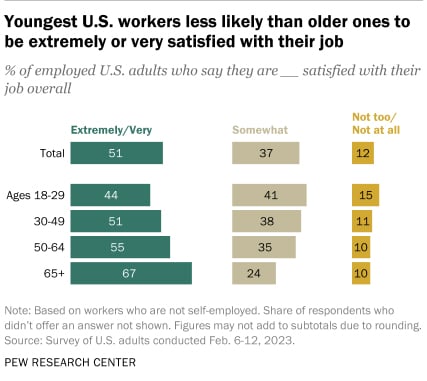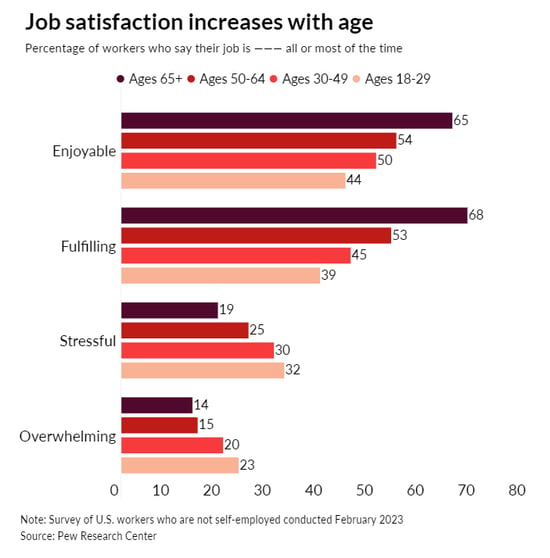According to a Pew Research Center study conducted in February 2023, the answer is “seniors.” Seniors are generally more satisfied with their jobs than younger cohorts. Among those workers ages 65+ who are not self-employed, 67% are “extremely/very satisfied” with their jobs. And 55% of workers, 50-64, are “extremely/very satisfied” as well. As a cohort, they are much more likely than younger workers to be happy in their jobs as is depicted in the graphic below.[1]

So Why Are Older Workers Happier?
The Pew survey suggests that many people 65 and older continue to work later in life because they find employment fulfilling. Furthermore, according to AARP vice president Carly Roszkowski, older workers feel respected, included, and feel that their opinions are valued by their co-workers and their supervisors.[2] As the chart below demonstrates, seniors are more likely to find work enjoyable and fulfilling – yet less stressful or overwhelming – than their younger counterparts.[3]

There’s Nothing Magic about “Retirement Age”
Many seniors will continue to work well after they reach retirement age. According to AARP, 72% of today’s workers plan to continue working after retirement. And among those who do retire, 33% go back to work within two years after retirement.
Why?
- They may desire to continue working for the social connection work can provide – this is a major driver for retirees who volunteer or work for nonprofit organizations.
- They may need a financial cushion because their retirement benefits are insufficient.
- They are simply achievers who often run their own businesses.
Older Workers Bring a Lot to Their Jobs
Not only are older workers happy to be on the job, but they are bringing value that many younger workers can’t match in terms of experience and institutional knowledge. These factors combine to deliver a degree of collective wisdom that can be helpful to almost any business.
The value of older workers goes beyond experience, knowledge, and wisdom. According to the U.S. Bureau of Labor, employers really like older workers, rating them high on a lot of attributes such as:
- Judgment
- Commitment to quality
- Attendance
- Punctuality
- Work ethic
- Stability in the market
- Patience
Opportunities for Marketers
Marketers need to pay attention to this growing trend of retirement-age workers, who are very content to remain in the workforce. They will need products and services that help them perform their work-related duties. Assistive technologies ranging ergonomic keyboards and microphone headsets in the office to mobility aids and ergonomically-designed tools used outside the office can help older workers perform better and make daily work chores physically easier. Anti-inflammatory pharmaceuticals can also aid physical performance. In fact, any technology that helps an older worker keep pace with the increasing speed-of-business is a win for an employee and his/her employer.
The post-retirement working class will continue to expand. These older employees – and their employers – will be seeking aids to help them maintain their high performance levels. Marketers who can deliver these aids will be big winners over the coming decade.
[1] “Young Workers Express Lower Levels of Job Satisfaction than Older Ones…;” Pew Research Center; May 25, 2023
[2] Kenneth Terrell; “Older Workers Are the Happiest Workers, Survey Finds;” AARP; August 31, 2023
[3] Ibid.









